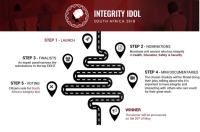Integrity Idol South Africa, an initiative to recognise civil servants who continuously show integrity through their actions, was launched at Constitution Hill in Braamfontein, Johannesburg, on Tuesday 16 January 2018.
"Naming and faming is so much more useful than naming and shaming,” said Jean Scrimgeour, Strategy and Operations Manager at Accountability Lab, as she proudly announced the launch of Integrity Idol in South Africa, the sixth country to participate in the initiative. Accountability Lab is running the campaign in partnership with the Nelson Mandela Foundation, LifeCo UnLtd and the Democracy Works Foundation.
The initiative aims to inspire a national movement to honour, encourage and connect honest civil servants. It’s a move away from “naming and shaming” corrupt leaders towards “naming and faming” those bureaucrats who work with integrity and do the right thing, even when no one is watching.
In a panel discussion facilitated by Nelson Mandela Foundation media analyst Lunga Nene, the Foundation’s Chief Executive, Sello Hatang, said public service is something that we all should aspire to help improve. He said this kind of initiative allows us to celebrate those who don’t buckle under the pressure of power to take part in corrupt activities.
If Integrity Idol can do anything, Hatang said, it’s to encourage each person to find the Madiba in themselves. “Integrity Idol is about finding that municipal manager in some small-town municipality in the North West who says, ‘I’m not going to buckle to just give you the tender because so-and-so is in charge.’”
Democracy Works Foundation associate Thandi Matthews said South Africans are losing faith in our democracy and the Constitution because of the high levels of inequality and unemployment in the country. She said we need to focus on health, education, safety, security and strengthening our criminal justice system, and recognise the value that ordinary people add to our democracy.
“I think it’s important that we don’t only highlight the gaps in our democracy, and the fact that we have poor leadership at times, but that there are also ordinary people working in our administration, at the coalface of service delivery, who ought to be celebrated. They go to work every day, and they have to deal with all of the negativity and the negative reinforcement,” she said.
Said Scrimgeour: “Often as South Africans we feel we can’t do anything because ‘I’m not a lawyer or I’m not a judge or because I don’t have lots of money’, and I think this [Integrity Idol] is something really positive, really low-key. You don’t have to have any money to do it, and you don’t need to be powerful or rich or be some kind of massive mover and shaker to find a person who makes a difference in your community.”
LifeCo CEO Pat Pillai said South Africa needs positive role models and believes that recognising civil servants when they do good work will have a knock-on effect as they deal with the public. “No nation can thrive without integrity.”

Five years ago, Nepal was the first country in which Integrity Idol was introduced. According to Scrimgeour, by last year one in every four Nepalese citizens took part in the initiative in some way – whether it was by nominating someone they believed has integrity or by being nominated.
Integrity Idol has since been successfully implemented in Liberia, Mali, Pakistan and Nigeria, with South Africa being the sixth country to take part.
So far, the winning Idols have gone on to lead important reform processes in their countries based on the trust and credibility generated through Integrity Idol. The Accountability Lab is now working with these winning Idols to expand their integrity networks to do everything from developing national policies to redesigning curricula for civil service training schools.
Want to nominate someone?
Nominate a civil servant you think deserves the title of South Africa’s Integrity Idol here. You can also follow the initiative, with the official hashtag #IntegrityIdol, on Instagram, Twitter and Facebook.
Nominations are open until the end of February 2018, whereafter an expert panel of respected South Africans will narrow down the nominees to the top 10 candidates. Young South African filmmakers will then develop short films of the finalists doing their jobs with integrity, which will be shown on TV and social media platforms. Audio versions will be broadcast on community radio stations.
South Africans will then have the opportunity to vote for their Integrity Idol through SMS, social media, WhatsApp and online. The winner will be announced at a public ceremony on 20 May 2018.